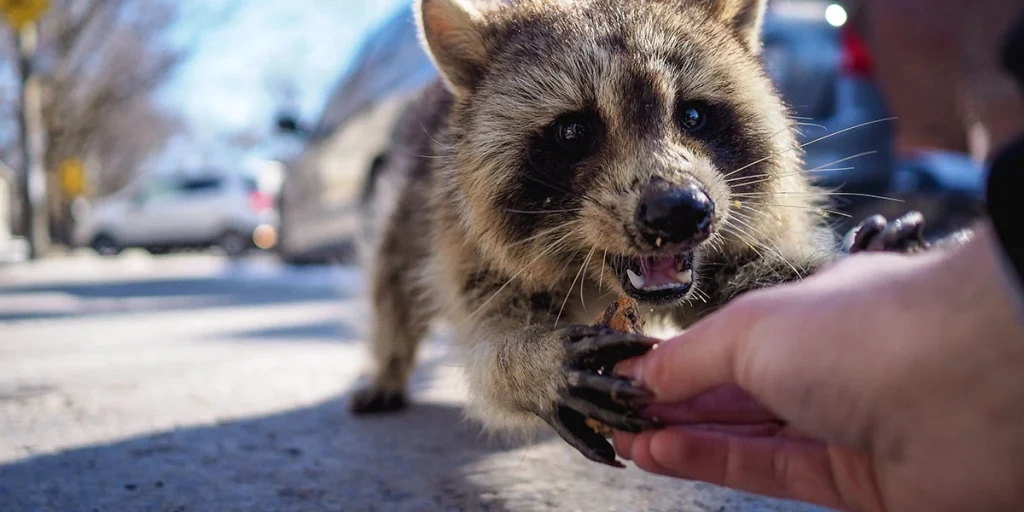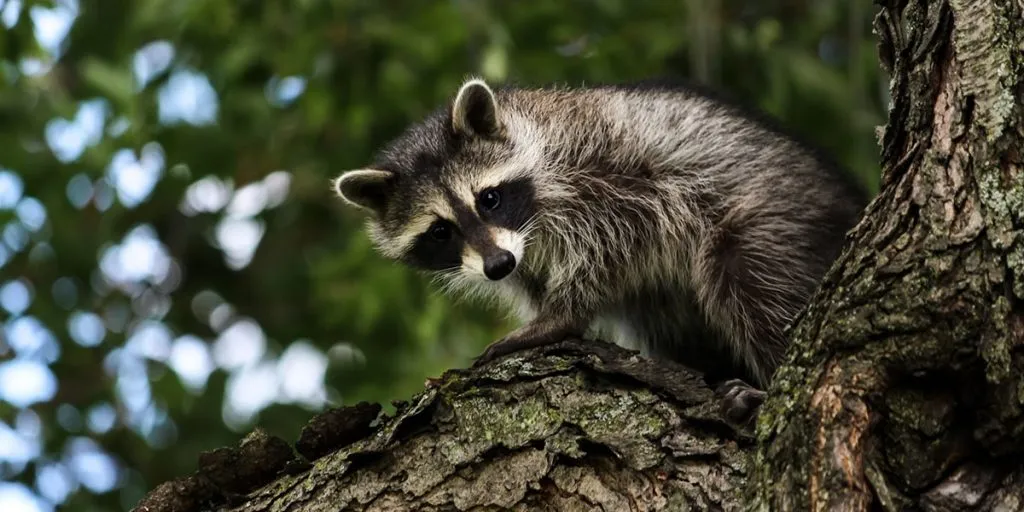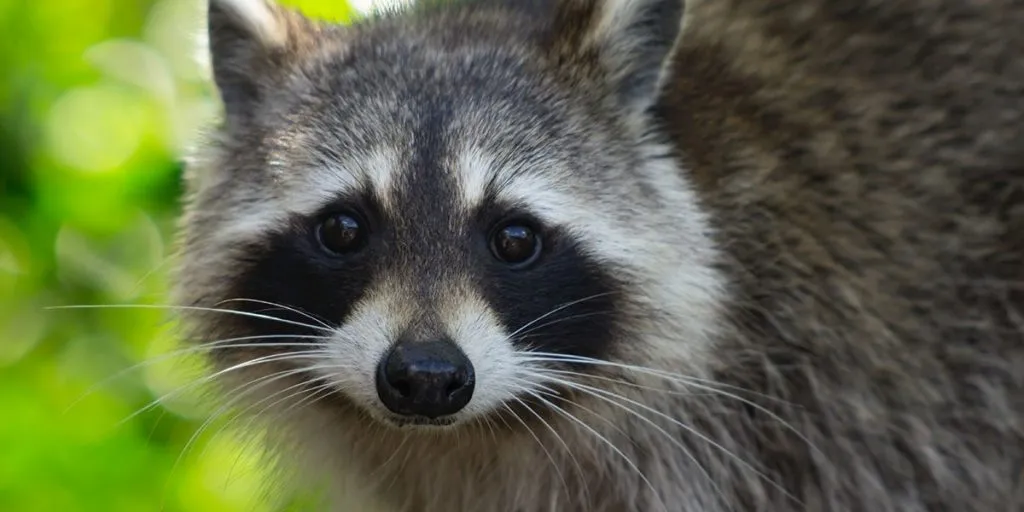When a scared or aggressive raccoon bites a human, dog, cat, or other pet, the wound might seem insignificant at first. However, there is a serious health risk associated with raccoon bites, which should be taken seriously right away.
According to the Center for Disease Control and Prevention (CDC), you should treat a raccoon bite by washing any wounds immediately with soap and water. The CDC recommends seeing a healthcare professional as soon as possible to determine the risk of contracting the rabies virus.
Raccoons are one of the primary carriers of the rabies virus in the United States, which can be deadly if left untreated. However, the bite wound trauma should always have priority over taking a rabies vaccine. Rabies is a medical urgency, not an emergency.
What Does A Raccoon Bite Look Like?
A raccoon bite looks like a set of upper and lower teeth marks on the skin of the bite victim. Bite marks might differ based on the body part that’s bitten, and hair might absorb some of the impacts of a bite. A raccoon bite can look bruised around the bite mark.
In a 2017 Canadian news report, a Vancouver woman was featured that got attacked after feeding aggressive adult raccoons. Her leg was bitten and bruised. At the same time, her dogs got bitten in the head, which left some serious wounds. The Twitter image below shows these wounds clearly:
Another Vancouver woman and her dog are injured in vicious raccoon attack. She tells us her story today at 4:30 on @CKNW pic.twitter.com/8iiabB6KTg
— Lynda Steele 🎙🌻 (@steeletalk) November 3, 2017
How To Treat A Raccoon Bite
According to the CDC, you should treat a raccoon bite by stopping the bleeding, washing it with water, and disinfecting the wound. Wash the wound with soap and water for at least five minutes. Next, contact a healthcare professional as soon as possible to assess the risk of infection.
When a raccoon attacks, it usually does so by biting and scratching. Both will leave physically visible wounds on the skin, which might not look too bad once the bleeding has stopped. Despite this, the risk of infection should be taken very seriously.
Not only the wound itself can get infected, raccoons can also carry viruses like rabies. This can be a deadly virus if left untreated. While urgent, the danger should not be overstated: only one or two people a year die from a confirmed rabies infection in the US. These often come from rabid dogs or other wildlife, but rarely from a raccoon bite.
Raccoon Bite Treatment: What To Expect
When visiting a healthcare professional for a raccoon bite treatment, wound treatment and infection prevention are a top priority.
Please note that the information below should not be seen as medical advice and this is not written by a healthcare professional. That being said, a doctor will treat a raccoon bite with a procedure similar to the following:
- The bite wound will get cleaned, and any dirt or excess blood will be removed
- Next, the bite wound will be disinfected where possible
- After this, the wound will be examined in detail for risk of infection
- If needed, you’ll be scheduled for a rabies vaccine and/or any other required vaccines that can stop infections from developing (e.g. tetanus)
Do Raccoon Bites Hurt?
A raccoon bite will hurt more than a strong bite from a domestic house cat, and will rely solely on the sharpness of the raccoon’s teeth. The bite force quotient (BFQ) of a raccoon is around 100, compared to a BFQ score of 67 for a domestic house cat.
While a raccoon bite will hurt a lot, it is unlikely to permanently harm you. However, it’s not the bite force but the technique and location of the bite that ultimately determines how painful the experience will be.
A shallow bite in the leg will not be as painful as a deep bite in the wrist that directly hits a nerve ending. The parts of the body that move are more likely to hurt than those that don’t. Ultimately, the pain tolerance of the victim will also significantly affect how the pain is experienced.
How To Prevent A Raccoon Attack
Raccoons tend to be non-aggressive, social animals. They avoid conflict where possible, but can be unpredictable if they feel threatened in any way. After all, they are still wild animals that act based on their natural instinct.
To prevent any problems with attacking raccoons in the future, there are a few things you can do right away. The following practical tips can help you avoid a raccoon attack:
- Never feed a raccoon: They are perfectly able to feed themselves. When you feed a wild animal, it will associate humans with food and keep coming back. When you don’t give a raccoon what it wants, the animal can become agitated and aggressive. Raccoons also tend to linger around houses where they know they’ll be able to get food, needlessly endangering your family and pets.
- Always keep your distance: Physical distance means safety, and wild animals understand this principle like no other. If you don’t want a wild animal to feel threatened by your presence, you give them as much space as possible. Don’t make any sudden movements, back away slowly, and don’t press the animal into a corner where it cannot escape anymore.
- Keep pets inside at night: Raccoons are most active at night, which is when they’ll come near homes to find a meal. During mating season, male raccoons will fight at night. These are the moments when you’d want your cats and dogs indoors. Avoid leaving cat food outside overnight.
- Create an unattractive environment: Discourage a raccoon to come near your property. Sheds, old vehicles, trees, rooftops, and chimneys are all prime locations to build a nest. You can also discourage raccoons with smells they strongly dislike.
- Call removal services: Once you notice raccoons near your property, the most effective method of removal is relocation. A professional raccoon removal company can help you get rid of raccoons in an animal-friendly manner.



